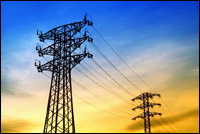Climate Cities
All Stories
-
Put a Turkey in Your Tank
Biofuels from odd sources gain new fans Just about anything organic, from turkey entrails to cow dung, can be used to make biofuel, and with oil over $60 a barrel, just about everything is. Changing World Technologies’ refinery uses the feathers, bones, fat, and other bits from a nearby turkey-processing plant to make up to […]
-
Top green-building system is in desperate need of repair
This piece is excerpted from the essay “LEED Is Broken; Let’s Fix It.” The full essay can be found here. Pan of green gables. Once the narrow province of hippies in beads and Birkenstocks, the green-building world has in the last five years blossomed and taken on a professional sheen. That’s thanks in large part […]
-
LEED green-building program confronts critics and growing pains
“I didn’t like the ‘LEED is broken’ part, but I did like the ‘Let’s fix it’ part,” said U.S. Green Building Council President and CEO Rick Fedrizzi, referring to a critique of his organization’s building-certification program that has been much discussed in green-building circles. Green building is growing up. Published this spring by somewhat sympathetic […]
-
Let My People Slow
Katrina revealed longstanding “automobile apartheid” One of Hurricane Katrina’s many lessons is that those who walk, cycle, or ride public transit instead of owning a car get treated like second-class citizens. Getting stranded during a natural disaster is an extreme example, but it’s of a piece with public-policy decisions across the country that prioritize the […]
-
Brian Hayes’ Infrastructure offers a tour of the “unnatural” side of America
Transmission accomplished. The unprecedented hurricane season that flooded New Orleans and flattened much of the Gulf Coast this summer brought both catastrophe and an historic opportunity: building more-sustainable cities and infrastructure has suddenly become a hot topic. New Orleans doesn’t need only restored wetlands and stronger levees to offer protection from future hurricanes and rising […]
-
In which we ask a mess of smart people what should happen in New Orleans
Unless you’ve been living under a rock — and these days, we can’t say we’d blame you — you’ve probably put at least a smidgen of thought toward the fate of New Orleans. It’s a rare thing to reconstruct an American city from scratch (though we can think of a few more cities we’d put […]
-
School choice could be an answer to sprawl
Imagine a country — we’ll call it Hobsonia — that requires all its residents to shop at officially assigned supermarkets based on where they live. Now, Hobsonians care passionately about food, and since the law allows them to move if they wish, citizens decide where to live based largely on where they can buy groceries. […]
-
We Like Bike
Gas prices push U.S. bike sales to near-historic peak Glory be: More bicycles than cars have been sold in the U.S. in the past 12 months. That’s about 19 million bicycles — nearing the 20 million sales peak during the early 1970s oil embargo — and roughly $5 billion to $6 billion in business, according […]
-
Umbra on used cars
Dear Umbra, With rising — OK, skyrocketing — gas prices, I would like to invest in a car that gets good mileage and is reliable. However, I can’t afford a new Toyota Prius. Do you have any suggestions for environmentally friendly used cars that those of us on a budget might be able to invest […]
-
Sacrificial Sham
Bush asks Americans to avoid unnecessary car trips and save energy President Bush yesterday called on Americans to drive less and conserve gas. “We can all pitch in,” he said. Of course, “all” is relative: Though the president directed federal agencies to reduce energy use, Republican congressional leaders were meeting even as he spoke to […]




